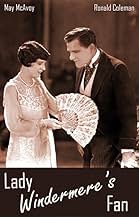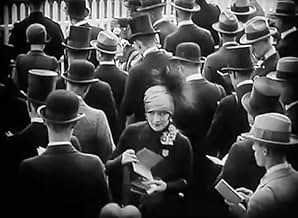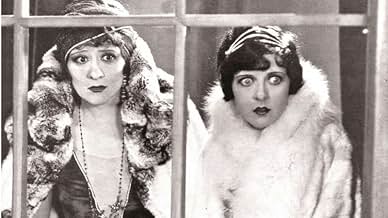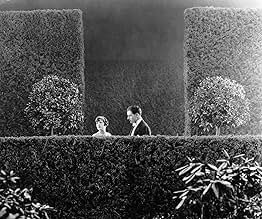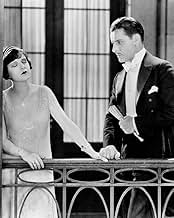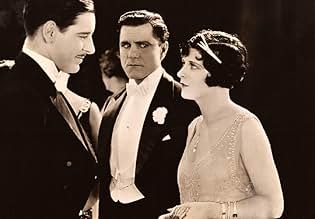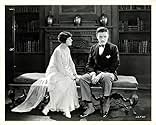NOTE IMDb
7,2/10
1,5 k
MA NOTE
Une femme mondaine croit que son mari la trompe, une méprise qui pourrait avoir des conséquences désastreuses pour tous les protagonistes.Une femme mondaine croit que son mari la trompe, une méprise qui pourrait avoir des conséquences désastreuses pour tous les protagonistes.Une femme mondaine croit que son mari la trompe, une méprise qui pourrait avoir des conséquences désastreuses pour tous les protagonistes.
- Réalisation
- Scénario
- Casting principal
- Récompenses
- 1 victoire au total
Edward Martindel
- Lord Augustus Lorton
- (as Edw. Martindel)
Carrie Daumery
- The Duchess of Berwick
- (as Mme. Daumery)
Billie Bennett
- Lady Plymdale
- (non crédité)
Michael Dark
- Party Guest
- (non crédité)
Helen Dunbar
- Mrs. Cowper-Cowper
- (non crédité)
Frank Finch Smiles
- Waiter with Party Guest List
- (non crédité)
Larry Steers
- Party Guest
- (non crédité)
Ellinor Vanderveer
- Party Guest
- (non crédité)
Percy Williams
- Waiter at the Party
- (non crédité)
Avis à la une
'Lady Windermere's Fan' is one of the great plays of Oscar Wilde, so it is curious to see it here as a big budget silent film from Warners Brothers. Starring May McAvoy and Bert Lytell as the Windermeres, with Irene Rich as Mrs Erlynne and a young Ronald Colman as Lord Darlington, this film is directed by Ernst Lubitsch, known mainly now for his stylish musicals and dramas from the sound era.
Despite the obvious drawback of not using any of Wilde's text, either spoken or as title cards, this adaptation does succeed in putting across most of the play's plot, just making a little tweak here and there to move the plot along or to bring matters to a satisfactory conclusion. Sets and costumes are of the jazz age and are beautiful, and McAvoy is a winsome Lady Windermere, all indignant eyes and little rosebud mouth.
The film however belongs to Irene Rich who portrays Mrs Erlynne as desperate, calculating, and everything in-between. She was a superb technician without overacting, and it's a pleasure to watch her. Ronald Colman as well shows signs of the star quality to come.
This 'Lady Windermere' is well worth watching.
Despite the obvious drawback of not using any of Wilde's text, either spoken or as title cards, this adaptation does succeed in putting across most of the play's plot, just making a little tweak here and there to move the plot along or to bring matters to a satisfactory conclusion. Sets and costumes are of the jazz age and are beautiful, and McAvoy is a winsome Lady Windermere, all indignant eyes and little rosebud mouth.
The film however belongs to Irene Rich who portrays Mrs Erlynne as desperate, calculating, and everything in-between. She was a superb technician without overacting, and it's a pleasure to watch her. Ronald Colman as well shows signs of the star quality to come.
This 'Lady Windermere' is well worth watching.
At first it might not seem as if the combination of Ernst Lubitsch and Oscar Wilde would work very well, but this silent-screen adaptation of Wilde's "Lady Windermere's Fan" is both enjoyable and well-crafted. Instead of clashing, Lubitsch's stylish, mischievous approach and Wilde's perceptive cynicism complement each other. The characters and the story are Wilde's, the acting and the style are Lubitsch's.
Although the material is heavily re-worked from the original play, Lubitsch's decisions all seem to work pretty well. Wilde's witty and resourceful dialogue is gone, but his insightful portrayals of human nature remain. Lubitsch also makes good use of the camera to bring off some shots that could not have worked on the stage. In particular, at times he makes the fateful fan seem almost a full-fledged part of the cast.
This movie version features solid performances by May McAvoy and Bert Lytell as the Windermeres, with a youngish-looking Ronald Colman suitably ingratiating as Lord Darlington. But Irene Rich has the most interesting character, and as Mrs. Erlynne she also gives a fine performance that particularly stands out in her scenes with the other characters. She and Lubitsch both capture the nature of her unpopular but admirable character, while carefully setting up the contrasts and conflicts between her and the other characters, who are in general more socially acceptable but far less worthy.
This also works well simply as an entertaining, often very amusing, and sometimes dramatically compelling story. For most silent film fans, it would definitely be worth tracking down and watching.
Although the material is heavily re-worked from the original play, Lubitsch's decisions all seem to work pretty well. Wilde's witty and resourceful dialogue is gone, but his insightful portrayals of human nature remain. Lubitsch also makes good use of the camera to bring off some shots that could not have worked on the stage. In particular, at times he makes the fateful fan seem almost a full-fledged part of the cast.
This movie version features solid performances by May McAvoy and Bert Lytell as the Windermeres, with a youngish-looking Ronald Colman suitably ingratiating as Lord Darlington. But Irene Rich has the most interesting character, and as Mrs. Erlynne she also gives a fine performance that particularly stands out in her scenes with the other characters. She and Lubitsch both capture the nature of her unpopular but admirable character, while carefully setting up the contrasts and conflicts between her and the other characters, who are in general more socially acceptable but far less worthy.
This also works well simply as an entertaining, often very amusing, and sometimes dramatically compelling story. For most silent film fans, it would definitely be worth tracking down and watching.
Perhaps only Ernst Lubitsch could have created this masterpiece, a play by one of the world's greatest users of words turned into a silent motion picture.
I remember seeing this at the late and very lamented Silent Movie Theatre on Fairfax in Los Angeles, in the 1970s. And I remember marveling then how Lubitsch was able to create such a magnificent work.
Yes, he had the help of superlative actors -- May McAvoy's performance was truly a revelation -- and of course had the basic Wilde play as well as Julien Josephson's adaption, but it's his camera placement and where the actors performed that make this such a wonder.
I cannot recommend too strongly this "Lady Windermere's Fan," but when you go to YouTube, be careful to check out the various editions before you settle down to watch. One is terrible, but the one I saw is great. Worthy of a great movie.
I remember seeing this at the late and very lamented Silent Movie Theatre on Fairfax in Los Angeles, in the 1970s. And I remember marveling then how Lubitsch was able to create such a magnificent work.
Yes, he had the help of superlative actors -- May McAvoy's performance was truly a revelation -- and of course had the basic Wilde play as well as Julien Josephson's adaption, but it's his camera placement and where the actors performed that make this such a wonder.
I cannot recommend too strongly this "Lady Windermere's Fan," but when you go to YouTube, be careful to check out the various editions before you settle down to watch. One is terrible, but the one I saw is great. Worthy of a great movie.
An epigram-less silent screen version of Oscar Wilde by Ernst Lubitsch is likely to be a contest rather than a collaboration (and not surprisingly Lubitsch wins).
Irene Rich's handsome profile in the role of Mrs Erlynne provides a sight to savour throughout, and the race meet at which we see her from constantly switching viewpoints as people study her through their binoculars is one of the visual & cinematic highlights of the film.
Irene Rich's handsome profile in the role of Mrs Erlynne provides a sight to savour throughout, and the race meet at which we see her from constantly switching viewpoints as people study her through their binoculars is one of the visual & cinematic highlights of the film.
I agree with the other reviewers that Lubitsch did a great job reworking parts of Wilde's play to make it suitable for silent film, and adding some of his signature touches. But I don't think the movie stands up to some of his later pieces, such as "Trouble in Paradise" and "Design for Living" (also reworked from a famous play, to good advantage). "Lady Windermere's Fan" is much more slow-paced, which can make it hard for a modern viewer, and not all of the characters are as interesting. However, the performances are good, especially the marvelous Irene Rich (whose high-fashion costumes are endlessly entertaining), the production values are high, and if you have the patience, you will be rewarded with some nice little bits of Lubitsch's social observation. It's interesting to consider how drastically attitudes toward male-female relations have changed over the decades: the film's plot depends on beliefs that have mostly, and rightfully, vanished. In contrast to convention, Lubitsch obviously enjoyed helping Rich create an older woman who was fascinating and sexually powerful.
Le saviez-vous
- AnecdotesOne of the 50 films in the three-disk boxed DVD set called "More Treasures from American Film Archives, 1894-1931" (2004), compiled by the National Film Preservation Foundation from five American film archives. This film is preserved by the Museum of Modern Art, has a running time of 89 minutes and an added piano music score.
- Citations
Opening title card: Lady Windermere faced the grave problem of seating her dinner guests.
- ConnexionsFeatured in Historia del cine: Epoca muda (1983)
Meilleurs choix
Connectez-vous pour évaluer et suivre la liste de favoris afin de recevoir des recommandations personnalisées
- How long is Lady Windermere's Fan?Alimenté par Alexa
Détails
- Date de sortie
- Pays d’origine
- Langue
- Aussi connu sous le nom de
- Lady Windermere's Fan
- Lieux de tournage
- Toronto, Ontario, Canada(Racetrack Scene)
- Société de production
- Voir plus de crédits d'entreprise sur IMDbPro
Box-office
- Budget
- 320 000 $US (estimé)
- Durée2 heures
- Mixage
- Rapport de forme
- 1.33 : 1
Contribuer à cette page
Suggérer une modification ou ajouter du contenu manquant

